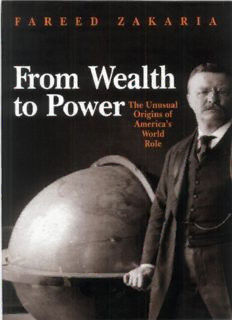
From Wealth to Power: The Unusual Origins of America's World Role PDF
Preview From Wealth to Power: The Unusual Origins of America's World Role
FROM WEALTH TO POWER PRINCETON STUDIES IN INTERNATIONAL HISTORY AND POLITICS Series Editors Jack L. Snyder, Marc Trachtenberg, and Fareed Zakaria Recent titles: The Moral Purpose of the State: Culture, Social Identity, and Institutional Rationality in International Relations by Christian Reus-Smit Entangling Relations: American Foreign Policy in Its Century by David Lake A Constructed Peace: The Making of the European Settlement, 1945-1963 by Marc Trachtenberg Regional Orders at Century's Dawn: Global and Domestic Influences on Grand Strategy by Etel Solingen Prom Wealth to Power: The Unusual Origins of America's World Role by Fareed Zakaria Changing Course: Ideas, Politics, and the Soviet Withdrawal from Afghanistan by Sarah E. Mendelson Disarming Strangers: Nuclear Diplomacy with North Korea by Leon V. Sigal Imagining War: French and British Military Doctrine between the Wars by Elizabeth Kier Roosevelt and the Munich Crisis: A Study of Political Decision-Making by Barbara Rearden Farnham Useful Adversaries: Grand Strategy, Domestic Mobilization, and Sino-American Conflict, 1947-1958 by Thomas J. Christensen Satellites and Commissars: Strategy and Conflict in the Politics of Soviet-Bloc Trade by Randall W. Stone Does Conquest Payf The Exploitation of Occupied Industrial Societies by Peter Liberman Cultural Realism: Strategic Culture and Grand Strategy in Chinese History by Alastair Iain Johnston The Korean War: An International History by William Stueck FAREED ZAKARIA From Wealth to Power The Unusual Origins of America's World Role PRINCETON UNIVERSITY PRESS PRINCETON, NEW JERSEY Copyright © 1998 by Princeton University Press Published by Princeton University Press, 41 William Street, Princeton, New Jersey 08540 In the United Kingdom: Princeton University Press, Chichester, West Sussex All Rights Reserved Fourth printing, and first paperback printing, 1999 Paperback ISBN 0-691-01035-8 The Library of Congress has cataloged the cloth edition of this book as follows Zakaria, Fareed. From wealth to power : the unusual origins of America's world role / Fareed Zakaria. p. cm. Includes bibliographical references and index. eISBN: 978-1-40082918-7 1. United States —Foreign relations —1865-1921. 2. International relations. I. Title. E661.7.Z35 1998 327.73-dc21 97-34245 This book has been composed in Sabon The paper used in this publication meets the minimum requirements of ANSI/NISO Z39.48-1992 (R1997) (Permanence of Paper) http://pup.princeton.edu Printed in the United States of America 10 9 8 To my parents RAFIQ AND FATMA ZAKARIA Contents Preface Chapter One Introduction: What Makes a Great Power? Chapter Two A Theory of Foreign Policy: Why Do States Expand? Chapter Three Imperial Understretch: Power and Nonexpansion, 1865-1889 Chapter Four The Rise of the American State, 1877-1896: The Foundation for a New Foreign Policy Chapter Five The New Diplomacy, 1889-1908: The Emergence of a Great Power Chapter Six Conclusion: Strong Nation, Weak State Preface THIS BOOK is a product of interest and frustration; interest in history and political science, and frustration with the study of international relations. International relations is studied nowadays with a serious involvement in either history or social science theory, but rarely both. (This is partly a reflection of the ever-increasing professionalization of disciplines in the academy.) I have tried to make a small contribution to what I think is a necessary joint enterprise, examining the historical record for insights and evidence that shed light on broad theoretical topics in world politics, such as the rise of new great powers. I was fortunate to have been in two ideal environments for scholarship, first as an undergraduate and then as a Ph.D. student. My interest in history was nurtured at Yale's dazzling history department, where Paul Kennedy, Robin Winks, and Vasily Rudich were particularly generous with their time and attention. At Harvard I learned to think like a social scientist. The Department of Government at Harvard was an extraordinary place, crammed with wide-ranging intelligence, erudition, and, above all, argument. For their advice, encouragement, and friendship I am deeply grateful to Samuel P. Huntington, Stanley Hoffmann, Robert Keohane, Joseph Nye, and the late Judith Shklar. I was awarded fellowships by the Center for Science and International Affairs, the Center for International Affairs, and the Olin Institute for Strategic Studies, which were indispensible to completing this project. At Foreign Affairs, James Hoge has generously allowed me the time and flexibility to write, which made it possible to turn a dissertation into a book. Princeton University Press has been enthusiastic and helpful from the start, for which I owe thanks to its director, Walter Lippincott; Malcolm Debevoise; and Malcolm Litchfield. Ronald Krebs helped greatly with the final revisions. Ib Ohlsson drew an elegant map to help me make my point. Over the years, many friends have listened to parts of this project as it progressed from an outline to a book. I want to thank them all, but especially those who read some part of it: Gideon Rose, Andrew Mor-avscik, Sean Lynn- Jones, Robert Lieberman, Timothy Naftali, Thomas Christensen, and Nicholas Rizopoulos. The final product has lost many of its early scars because of their constructive criticism. Finally, some personal thanks. As I was growing up in India, my interest in the world was kindled by two extraordinary people: Khush-want Singh, who taught me how to write, and the late Girilal Jain, who taught me how to think. Gideon, Dan, and Joanna Rose and Sheri Berman have been a wondrous combination of friends and family. My brother, Arshad, has been a pillar of support since we both left home for college fourteen years ago. I did not know my wife, Paula, when most of this book was written. Had I, she would have lifted my spirits then as she does each day now. Finally and most importantly, thanks to my parents, Fatma and Rafiq Zakaria, to whom this book is dedicated and who gave me more than I can ever explain, let alone repay.
Description: